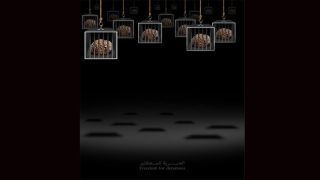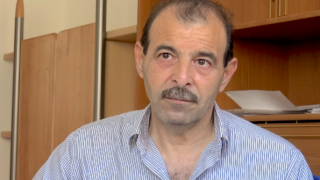(Damascus) Abu Ibrahim (pseudonym, 40) thought the worst was over when he was finally sentenced by the Court of Terrorism to seven years in a Syrian prison. But, he came to realize that he was wrong, the real problem was just starting.
“Did you know they can confiscate all your belongings? Did you know that? They can even make you spit your mother’s milk if they wanted,” he told SyriaUntold.
A lot has been said about detainees and their suffering and about seizing Syrians’ assets as per reconstruction decrees or other dictats issued by the regime. But, the position of a person suffering arrest and asset seizure, deprivation of rights and prejudice, combined, is not enviable.
After surviving the investigation, not to mention the torture and denigration involved in that process, you reach the bitter prosecution phase, an undertaking devoid of any legal logic and plagued by an unfathomable extent of corruption. To wrap it all up, you are locked up in jail with felons or criminals.
You soon start realizing the costliest and most enduring calamity of all: asset confiscat"?ion and seizure. That is the last legally-sanctioned ordeal of a victim who has survived the Syrian state.
“It is a real tragedy. The prisoner is released from jail to find none of his belongings and no roof above his head. All his life’s earnings have been confiscated, and he has lost everything,” Michel Shammas, defense attorney, told SyriaUntold.
For Abu Ibrahim, the real headache started once he stepped into jail. Being behind bars added a whole new layer of complexity to his life. Abu Ibrahim who was a skilled car trader, now had to provide for himself and his family—a wife, a son and a teenage girl—from jail.
He had to figure out how to pay back more than 10 million Syrian Pounds (SYP) [$22000] in work debt due to the confiscation and to come up with the bribes he needed—no less than 3 million SYP [$7000]—to end his arrest, knowing that he was not working. He was in jail for delivering supplies to besieged areas, which is equivalent to financing terrorism under the 2012 Counter-Terrorism Law No. 19. Abu Ibrahim sent his children to private schools and would not have it otherwise. He was among the wealthiest and most generous in his neighbourhood.
Law, the enemy of justice
Article 11 of the law issued by the president states that “the prosecutor, or whoever he authorizes, may decide to freeze the movable and immovable property of anyone who perpetrates a crime in connection with the financing of terrorist acts, or any of the crimes stated herein, if there is enough evidence, to secure the rights of the State and the people affected.”
Article 12 states that “in all crimes stated herein, the court shall decide the confiscation of the movable and immovable property [of perpetrators] and the proceeds thereof, as well as the objects used or prepared to be used in committing the crime. The court shall also decide the dissolution of the terrorist organization, if any.”
Just like all other articles under the Counter-Terrorism Law, the implementation of these articles is binding and might include any other acts having innovative names that the public prosecution coins, like intervention in, promotion of or coverage for terrorism.
“Most legal texts are vague and open to interpretation,” Shammas who was the defense attorney of prisoners of conscience then of terrorism told SyriaUntold, before he himself became wanted by the regime and migrated to the Netherlands.
Abu Ibrahim believes all Syrian people are subject to terrorism accusations.
“It’s hit or miss,” he says.
Hussein (pseudonym, 29), a taxi driver, was accused of indirectly intervening in financing terrorism, because an opposition member who supports detainees’ families was arrested while in Hussein’s car, end of 2015. After more than two years in prison, Hussein was released under trial, in exchange for a bribe of 2 million SYP [$2200] that is modest compared to the current astronomical bribes. Hussein needed money, so he mortgaged a piece of land he owns then travelled to Lebanon early 2018. His assets are frozen, and he can’t pay off the mortgage. What’s worse, there is no legal way to get the land back. He said that the unlucky person who took the land will have to deal with the problem.
“This government does not allow you to be fair,” he said.
Daniel (pseudonym,, 20) from Damascus is an attorney who received his training at a law office specialized in terrorism cases.
“If only the days of the emergency law would return,” he wished, while thinking about the touching stories and losses of his clients.
Despite the oppression, Daniel believes the situation was less corrupt before the state of emergency was lifted in 2011. The law had been enforced since the Baath Party took over the rule in 1963. Theft is the most supreme law currently practiced by the state against its citizens. The detainees are just an easy target. He added that all persons accused by the Court of Terrorism—estimated at 17,000 detainees in 2017—face extortion to be granted release, despite everything they went through in security branches.
As far as the detainees and their relatives know, bribery is almost the only way to fix the situation. Although bribery is also rampant in criminal cases, terrorism charges tend to be more unjust, due to the lack of a crime that is as clear-cut as in the other cases.
Bribery is often financially unattainable for detainees whose lives have turned into a series of injustices from the moment of their arrest to the freezing of their assets. Those who left Syria could also face asset seizure on charges of automatic opposition, and they can do nothing about it.
As soon as the verdict is pronounced, property is confiscated. So far, no pardon has been issued in this regard. All one can hope for is the mercy of the judge.
Samih (pseudonym, 20) is an activist serving a seven-year sentence in Aleppo Central Prison for offering relief for displaced families—or for financing terrorism, as the law calls it today.
“Many cases faced large fines but without confiscation of property in the past two years,” he said.
Judges range from harsh ones who are afraid of the security authorities and of suspicion of siding with the opposition, to bribed ones who benefit from confirmation of the crime and conviction. Meanwhile, the detainee is deprived of the possibility of receiving an extenuated sentence to avoid confiscation, although money is not really linked to the alleged crime.
The convicts are considered terrorists, are sentenced harshly out of caution and lose all their belongings for the same reason.
“They never have enough. This government sucks your blood out and still wants more,” Rabih (pseudonym, 23), a journalism student at the Lebanese University, complained.
He was cursing his bad luck when he spoke to SyriaUntold. Rabih is saddled with debts in Lebanon and struggling to bring his mother, who recently completed a four year jail sentence issued by Syria's Court of Terrorism. She had been charged with financing terrorism and feeding information [to terrorists], as she would post on her Facebook page updates relating to the violence in her parents’ neighborhood in Homs.
In the past, this crime was known as spreading false information, and its sentence was not much different. Except that crime was not labeled as “terrorism” but “opposition”. The mother completed her sentence in Adra Prison for Women. When she was released, she tried to go to Lebanon to meet her son who had fled to the neighbouring nation to avoid conscription in the Syrian army. Only then she discovered she had a travel ban. In fact, a travel ban, just like confiscation, is evident after one’s release. And, if the travel ban is lifted, the general intelligence only gives approval for a single exit.
Umm Rabih (50) was trying to sell some of her assets to come up with a sum that would help Rabih in his studies. But, she discovered that the state confiscated her assets, and that’s that. There is no clear way of dealing with confiscation so far. Releasing the detainee is the essence, and everything else is on hold, without any prospects for a solution.
“For those whose assets were confiscated as per conclusive judicial verdicts, the decision is irreversible,” Shammas clarified.
The confiscation includes any property, car or bank balance registered under the detainee’s name. Upon checking with the Vehicle Department, the Land Registry or Housing Department, you will find a sign preventing you from using your assets, without indicating clearly if the situation might change. This process is not explained within the details of the charges, and nothing is mentioned about the tools used to commit the crime. These charges are regulated by a law that cannot be referred to and that people do not pay attention to because they consider the lives of their loved ones in detention more important.
Injustice breeds corruption
According to Article 1 of the same law, freezing money is defined as “banning for a certain period or during the investigation and prosecution stages, the disposition, exchange, transfer or form change of any movable or immovable property.”
Confiscation is defined as “permanent appropriation of movables and immovable property by the State by virtue of a court ruling.”
Often, the arrested persons and those who have completed their sentences solve their issues using convoluted ways. They prepare sale contracts with dates prior to the arrest to deal with their oppression and regain their rights through the corrupt legal and administrative structure. But, even this is no longer an easy task, with the concession procedures at the Ministry of Finance, which means documenting contracts and paying late fines and taxes, becoming necessary to prove any sale. Undocumented contracts are not taken into account.
Samer (pseudonym, 30) from Damascus works worked as a minibus driver and owned nothing but his minibus. He served a one-year sentence for concealment of crime, which means refraining from reporting a crime to the competent authorities. In fact, he was imprisoned because he knew his relatives were affiliated with the Free Syrian Army (FSA). He was released from jail end of 2017. He tried to sell the minibus, which the state had not yet confiscated, and he resorted to every available illegal method to gather a sum of money that would allow him to leave Syria. However, he failed and almost exposed himself and got implicated in a fraud case. So, he ignored the only possession he had, borrowed money and travelled to Turkey.
“The law targets human rights activists and political opposition figures and oppresses them,” Shammas said.
Complete loyalty to the regime is the only option, and any deviation is equivalent to real suicide. If the person does not end up dying or arrested, he is deprived of all his possessions. Fear is the only reality for Syrians, and it is the way the regime is tightening its grip on them.
Seven years have passed since protests gave way to military conflict in Syria. Every person who opposed the regime served a sentence of some kind. Chapters of suffering for Syrians are ending while others are just starting. The confiscation of property is a problem for hundreds who were treated unjustly throughout detention. The state has been using the law to rob them.






